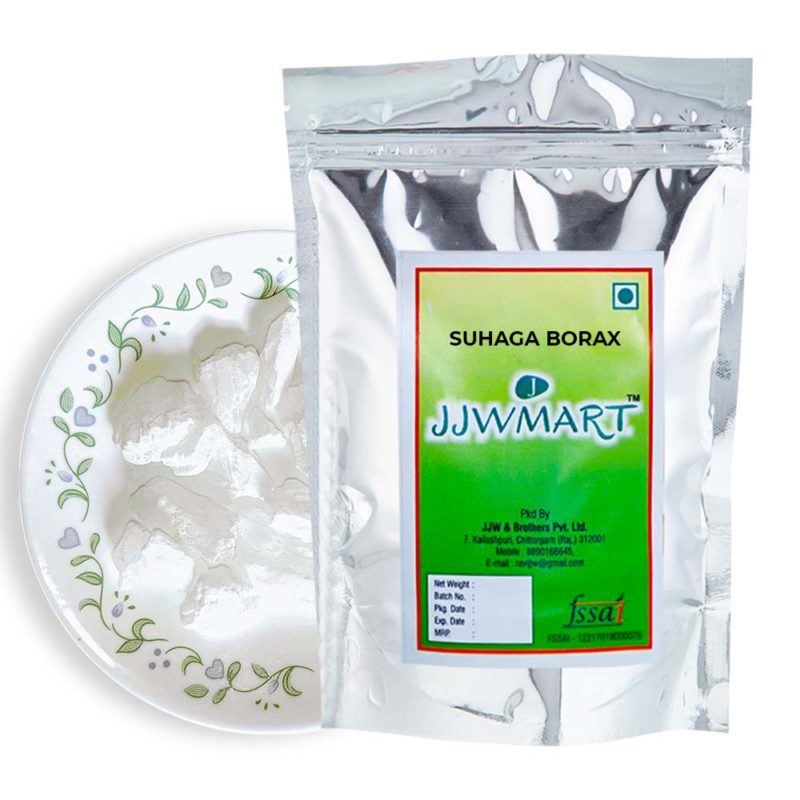Ayurvedic products and herbs, Suhaga
Suhaga Powder Benefits: A Comprehensive Guide to Health & Wellness
Discover the health benefits of Suhaga powder, from weight loss support to glowing skin and cough relief. Find out how Suhaga can enhance your wellness, tips for safe usage, and answers to common questions like “Is Suhaga safe for babies?” and “How can it help with dandruff?” Dive into this guide for a natural boost to your health routine.
Contents
What is Suhaga?
Suhaga, or borax, is a natural mineral commonly found in salt flats. It has been used for centuries, especially in Ayurveda, as a health and wellness booster. Suhaga is mainly used in powder form and has both internal and external benefits. Traditionally, Suhaga is heated until it puffs up into a white powder, then used in various health applications.
Nutritional Composition of Suhaga
The health benefits of Suhaga powder can be attributed to its unique mineral makeup. It’s primarily composed of boron, which plays a role in bone health, hormone regulation, and immunity. Additionally, it has trace minerals that contribute to its anti-inflammatory, antiseptic, and cleansing properties.
Also Read: Health Benefits of Makhana
Also Read: Health Benefits of Fenugreek
How to Use Suhaga Safely
Using Suhaga powder requires caution, especially if you’re new to it. Always start with a small amount and consult a healthcare professional for internal use. Generally, it’s safe for external applications, but it should be diluted with water or oils. Avoid using it in large quantities or over a prolonged period, as it can cause irritation or other side effects if misused.
Suhaga Benefits for Weight Loss
Looking to lose a few extra pounds? Suhaga powder may aid in weight loss by boosting metabolism. Although not a primary weight loss solution, it can be used as a supplementary aid to support your efforts, especially when combined with a healthy diet and exercise.
1) Suhaga Benefits for Skin
Suhaga powder is great for skin care! Its antiseptic and anti-inflammatory properties make it an excellent remedy for acne and skin infections. Mix a pinch of Suhaga powder with rose water or aloe vera gel to create a soothing face mask. Regular use can help reduce pimples, lighten scars, and give you a radiant complexion.
2) Suhaga for Cough Relief
One of the popular uses of Suhaga powder in Ayurveda is for cough relief. Mix a small amount with honey or warm water to help soothe the throat and reduce phlegm. Suhaga acts as a natural expectorant, clearing up respiratory passages and providing relief from congestion.
3) Suhaga Benefits for Hair
Dandruff can be a nuisance, but Suhaga powder might offer a natural solution. Its antibacterial properties make it an effective remedy for scalp issues. To use Suhaga powder for dandruff, mix a small pinch with coconut oil and massage it into your scalp. Rinse well after letting it sit for ten to fifteen minutes. Your scalp will feel refreshed, and regular use may help control dandruff.
4) Suhaga Powder Benefits Urinary Health
Suhaga powder may help support urinary health due to its mild diuretic properties. It can help with urinary tract discomfort by promoting urine flow and reducing inflammation. However, it’s best to consult a healthcare professional before using it for this purpose.
5) Aids in Women’s Health Concerns
In Ayurveda, Suhaga is sometimes recommended for women’s health, particularly for menstrual irregularities and discomfort. It is thought to help balance hormones and relieve menstrual pain. A pinch of Suhaga powder mixed with warm water can be taken under guidance for such purposes.
6) Alleviates Pain and Reduces Inflammation
Got sore muscles or joint pain? Suhaga powder is known for its anti-inflammatory properties and can be applied externally to alleviate aches. Mix it with a carrier oil and massage gently on the affected area for pain relief.
7) Borax Powder for Digestive Health
Suhaga powder is also valued for its digestive benefits. A small amount taken with warm water can aid digestion and reduce bloating. It’s traditionally used to treat indigestion and other minor stomach issues, though caution is essential here to avoid overconsumption.
Traditional Uses of Suhaga in Ayurveda
In Ayurvedic medicine, Suhaga powder is a multipurpose remedy. From respiratory health to skincare, it’s used to treat various ailments. Ayurvedic practitioners often combine it with other herbs and oils to maximize its effects, relying on Suhaga as a versatile component of traditional healing.
Precautions and Possible Side Effects
While Suhaga powder has many benefits, it must be used cautiously. Overuse can cause side effects such as skin irritation, digestive issues, or even toxicity if ingested in large amounts. Pregnant or breastfeeding women should avoid Suhaga unless directed by a healthcare professional. Always conduct a patch test if using it on the skin.
Buy Suhaga Powder Online: Buy Now
Conclusion:
Suhaga powder is indeed a fascinating natural remedy with a range of health and wellness benefits. From promoting clear skin to aiding digestion, this age-old remedy can be a valuable addition to your wellness toolkit. However, moderation and proper use are key. With a mindful approach, Suhaga powder could be your next go-to natural remedy for boosting health.
FAQs:
What is Suhaga powder used for?
Suhaga powder is used for various purposes, including skin and hair care, cough relief, weight loss support, and digestive health. It’s valued in Ayurveda for its versatile healing properties.
Is Suhaga good for babies?
Suhaga should not be used for babies unless under strict guidance from a healthcare professional, as infants have very sensitive systems and can react adversely.
How to use Suhaga powder for dandruff?
To use Suhaga powder for dandruff, mix a small amount with coconut oil, apply to your scalp, leave it on for 10-15 minutes, and then rinse thoroughly.
What are the benefits of borax powder?
Borax powder, or Suhaga, offers benefits like weight loss support, improved skin health, cough relief, and digestive aid. It’s often used in Ayurveda for its therapeutic properties.


